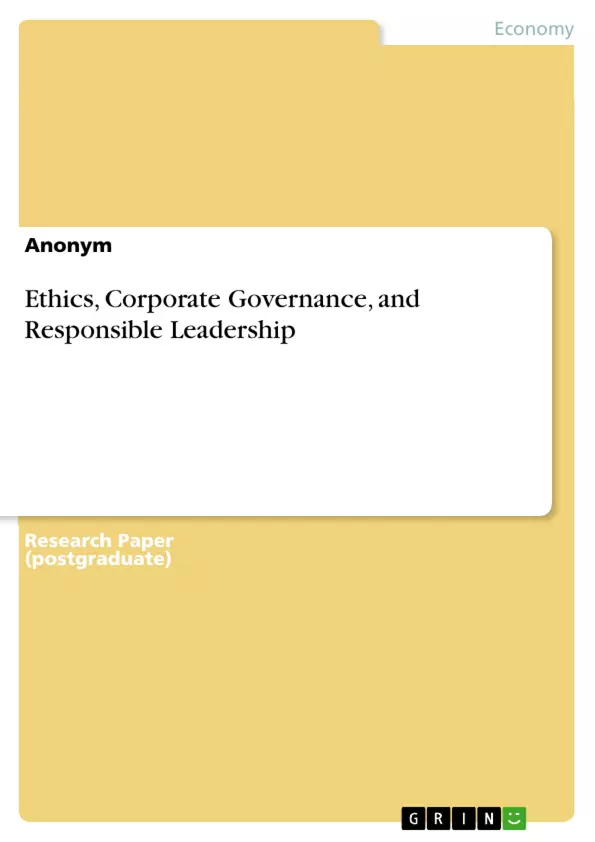Tesco is a leading global company in the United Kingdom that deals in groceries and consumer products. Tesco was established in 1919 and has expanded to be among the biggest grocery stores worldwide, with over 7,000 outlets in 12 nations (Ogacheko Omale, 2015). Corporate failure within the framework refers to instances where a company's practices, policies, or behaviors contravene ethical values and standards, violate sound governance principles, and disregard the duties of its leaders towards stakeholders, leading to adverse effects on the company's viability, reputation, and societal and environmental impacts (OECD, 2015). The Tesco grocery chain is an excellent case study of an organization that collapsed due to a board-level connection to a significant accounting fraud. This study critically analyzes Tesco's organizational flaws that contributed to the accounting crisis from the angles of ethics and corporate governance, examining the origins and effects of the scandal while leveraging empirical literature as well as ethical and corporate governance frameworks. The study will further provide recommendations for Tesco's management to improve the organization's ethical and corporate governance practices and prevent similar failures in the future.
In September 2014, Tesco reported inflating its revenues by £250 million (Kukreja and Gupta, 2016). As a result of the occurrence, eight of the corporation's senior executives were given administrative leave, which caused the stock price to fall noticeably. A top executive in the accounting division noticed illegal practices among colleagues that were obviously harmful to the common good and decided to report them to protect the interests of investors and other shareholders. After an employee expressed reservations about the firm's accounting procedures, the Financial Conduct Authority (FCA) launched an inquiry that revealed the accounting scandal.
Inhaltsverzeichnis (Table of Contents)
- Introduction
- Ethics
- Kantian Ethics
- Virtue Ethics
- Corporate Governance
- Agency Theory
Zielsetzung und Themenschwerpunkte (Objectives and Key Themes)
This study critically analyzes Tesco's organizational flaws that contributed to the accounting crisis from the angles of ethics and corporate governance. The study examines the origins and effects of the scandal while leveraging empirical literature as well as ethical and corporate governance frameworks. The study provides recommendations for Tesco's management to improve the organization's ethical and corporate governance practices and prevent similar failures in the future.
- Ethical and corporate governance failures in Tesco
- Impact of the accounting scandal on Tesco's stakeholders
- Application of ethical theories to analyze Tesco's actions
- Corporate governance frameworks and their relevance to Tesco's failure
- Recommendations for improving ethical and corporate governance practices in Tesco
Zusammenfassung der Kapitel (Chapter Summaries)
The introduction provides context for Tesco's corporate failure, highlighting the company's history and its significant role in the global grocery market. It describes the specific accounting scandal that led to the company's downfall and outlines the study's objectives and approach.
The chapter on Kantian ethics examines the ethical implications of Tesco's actions through the lens of Immanuel Kant's philosophy. It argues that Tesco's executives acted unethically by prioritizing their own interests over the interests of stakeholders, including customers, suppliers, and shareholders.
The chapter on virtue ethics explores the role of character and virtues in preventing corporate failure. It criticizes Tesco's executives for lacking virtues such as honesty, integrity, and diligence, highlighting the importance of cultivating virtuous character traits in board members and company culture.
The chapter on agency theory examines corporate governance from the perspective of the relationship between shareholders, the board of directors, and management. It suggests that corporate failure can occur when the board of directors prioritizes its own interests over the interests of shareholders, leading to issues such as excessive executive compensation and inadequate management oversight.
Schlüsselwörter (Keywords)
This study examines Tesco's corporate failure through the lens of ethics and corporate governance, focusing on concepts such as Kantian ethics, virtue ethics, agency theory, corporate social responsibility, and whistleblowing. It explores themes of ethical leadership, transparency, accountability, and the importance of long-term sustainability over short-term profitability.
Frequently Asked Questions
What caused the corporate failure at Tesco in 2014?
Tesco experienced a major crisis due to a board-level accounting fraud where profits were inflated by approximately £250 million.
How does Kantian ethics apply to the Tesco scandal?
From a Kantian perspective, the executives acted unethically because they treated stakeholders as a means to an end rather than fulfilling their duty to act honestly and protect the common good.
What is the role of Agency Theory in Tesco's failure?
Agency Theory highlights the conflict of interest where management (the agents) prioritized their own short-term bonuses over the long-term interests of the shareholders (the principals).
Why is whistleblowing significant in this case?
The scandal came to light only after a senior executive in the accounting division noticed the illegal practices and decided to report them to protect investors' interests.
What recommendations are made to prevent future failures?
The study suggests improving corporate governance frameworks, fostering a culture of virtue ethics (honesty and integrity), and ensuring stronger board oversight of financial reporting.
- Quote paper
- Anonym (Author), 2023, Ethics, Corporate Governance, and Responsible Leadership, Munich, GRIN Verlag, https://www.grin.com/document/1363921



